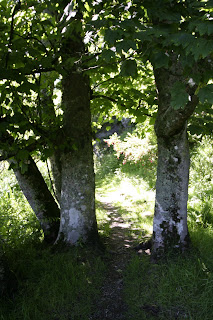
It's been a life affirming week for me - a week of intense study of Earth Jurisprudence at Shumacher College, followed by a UKELA weekend workshop in Derbyshire. Earth jurisprudence is aimed at ensuring that legal and governance systems support, rather than undermine, the integrity and health of the Earth through the development of an ecocentric approach to law and governance. While most of the world’s legal systems advance the interests and concerns of the human community and provide no real protection to other species, or to the planet itself, Earth jurisprudence proposes a radical overhaul of approaches to law making, to ensure that the planet and all species have rights, by virtue of their existence as members of a single Earth community.

But most life-affirming of all, after a week of concentrated examination of theory and application (and some unforgettable wild moments to boot) came wonderful news from Ecuador. Sunday 28th September brought a historic moment in the evolution of protection of our planet.
By an overwhelming margin, the people of Ecuador voted for a new Constitution that is the first in the world to recognize legally enforceable Rights of Nature, or ecosystem rights. In a country rich with ecological treasures, including the Galapagos Islands and part of the Amazon rain forest, the constitution also calls on government to avoid measures that would destroy ecosystems or drive species to extinction. Ecuador is now the first country in the world to codify a new system of environmental protection based on rights.
With this vote, the people of Ecuador are leading the way for countries around the world to fundamentally change how we protect nature.
Article 1 of the new "Rights for Nature" chapter of the Ecuador constitution reads: "Nature or Pachamama, where life is reproduced and exists, has the right to exist, persist, maintain and regenerate its vital cycles, structure, functions and its processes in evolution. Every person, people, community or nationality, will be able to demand the recognitions of rights for nature before the public bodies."
Ecuador's constitution recognizes that ecosystems possess the inalienable and fundamental right to exist and flourish, and that people possess the legal authority to enforce those rights on behalf of ecosystems, and the requirement of the government to remedy the violations of those ecosystem rights.
What is so interesting is that this Constitution has been borne out of crisis and driven at local municipal government level. Because there have been so many abuses, pollution, violence and corruption by foreign mining companies, the people revolted against this so-called development by central government. Thus, this remarkable piece of legislation was borne of the people taking responsibility for their land.
But all is not yet perfect. Whilst the Constitution is a vast bridge in the right direction, it does at the same time incorporate sweeping powers bestowed upon the President. Pressure from US and Canadian governments remains to allow mining in particular in the south of the country where there has been less local opposition. Time will tell whether the weight of US destruction continues or is prevented.
Nevertheless this is cause for huge celebration. The world’s environmental and social crisis will only get worse, unless humans are compelled by law to respect the laws of nature and the rights of other members of the Earth community. Ecuador's Rights of Nature Constitution is Wild Law in the making - and a vitally crucial precedent that other nations must follow.

Wild Law by Cormac Cullinan
Enact International
Centre For Earth Jurisprudence
Earth Jurisprudence
The Legal Defense Fund
The Pachamama Alliance
Cotacachi
UKELA












